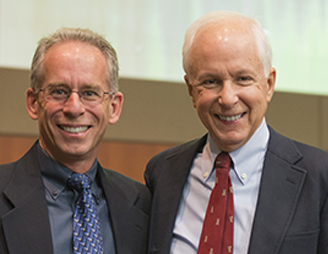On December 4, 2014, the Department of Pediatrics celebrated the accomplishments of Norman Fost, MD, MPH, a professor emeritus and bioethics pioneer who is retiring after 40 years of service.
‘Monumental Contributions’
The day began with a special Grand Rounds presentation introduced by David Allen, MD, who reflected on Dr. Fost’s “monumental contributions” to the institution over the past 40 years.
They include directing the Department of Pediatrics residency program for 20 years, founding and leading the University of Wisconsin Bioethics program for over 30 years, chairing the University of Wisconsin Institutional Review Board for 31 years, and chairing the UW Hospital and Clinics ethics committee for over 30 years.
Dr. Fost also served on President Clinton’s health care task force in the 1990s, and has sat on numerous national committees, including those at the National Institutes of Health and the Food and Drug Administration.
Annual Lecture in Bioethics

Douglas Diekema, MD, MPH (left), with Dr. Fost at the department’s first Annual Lecture in Bioethics.
Former resident Douglas Diekema, MD, MPH, then gave the department’s first Annual Lecture in Bioethics—a new event established in Dr. Fost’s honor.
Dr. Diekema is a 1989 residency program graduate who considers Dr. Fost one of his most influential mentors. He is a professor of pediatrics at the University of Washington School of Medicine and the director of education at the Treuman Katz Center for Pediatric Bioethics at Seattle Children’s Hospital.
Dr. Diekema is also the 2014 recipient of the American Academy of Pediatrics’ (AAP) William G. Bartholome Award for Ethical Excellence—an award Dr. Fost received in 2003.
He spoke about how brain development influences adolescent decision making, and through two case studies, showed how the limits of adolescents’ abilities to make sound decisions has substantial implications for injury prevention and the legal system.
Capping a Career
In his closing comments, Dr. Fost expressed sincere appreciation to the many departmental chairs and deans who supported his work over the past four decades.
Reflecting on a career highlighted with national appointments and media appearances, he said, “What really matters is what’s going on locally – the people who are close to you, the people who know you the best, the people you care about the most.”
“There are just so many people in this room that I feel that connection to… knowing that so many people care has been so gratifying.”